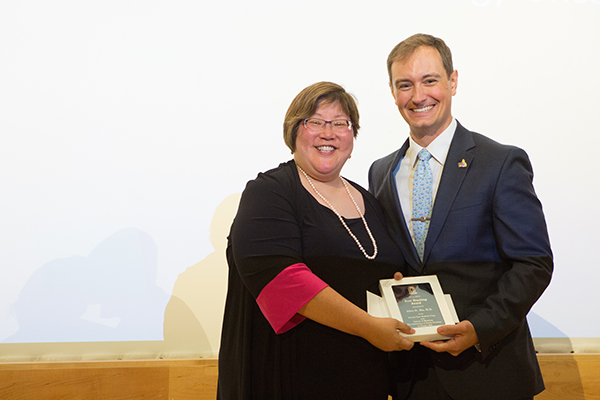Alice Ma, MD, associate professor, department of medicine, division of hematology-oncology, delivered this year’s Whitehead Lecture on August 19. The themes of Ma’s lecture closely followed its title: “Endurance, Obstacles, Perseverance and Joy: My Transformation from the World’s Crummiest Medical Student to Faculty at the World’s Best Medical School.”

Alice Ma, MD and Whitehead Medical Society co-president Patrick O’Shea. Photo by Brian Strickland.
By Jamie Williams, jamie.williams@unchealth.unc.edu
Whitehead Medical Society co-presidents Patrick O’Shea and Kyle Roedersheimer kicked off the 2015 Whitehead Lecture by asking the first-year students in the crowd to raise their hands. As more and more hands began to go up, the group got a large ovation from the crowd of fellow students and faculty members. The first-year students, who arrived on campus only a few weeks ago, were then treated to a lecture by Alice Ma, MD, associate professor, department of medicine, division of hematology-oncology, and an awards presentation recognizing the outstanding faculty members and fellow students they will learn from and with while at UNC.
The annual Whitehead Lecture serves as an unofficial convocation for the School of Medicine. It is named in honor of Dr. Richard Whitehead, who served as dean of the School of Medicine from 1890 to 1905. The Whitehead Lecture has been an annual event since 1947.
Each year, the student body elects a speaker to present the lecture. Being elected to deliver the Whitehead Lecture is among the highest honors for faculty members at the School of Medicine. In this role, Ma did not disappoint.
In her introduction, Julie Byerley, MD, MPH, Vice Dean for Education, called Ma a “role model to all of us.”
Self-deprecating wit characterized Ma’s speech, which narrated her winding road from medical school to her current position.
The themes of Ma’s lecture closely followed its title: “Endurance, Obstacles, Perseverance and Joy: My Transformation from the World’s Crummiest Medical Student to Faculty at the World’s Best Medical School.”
With great humor, Ma recounted her early struggles as a medical student. As she put it, “I didn’t expect medical school to be like this,” referring to the amount of memorization required. “There was no thinking involved,” she said. A year of research at the NIH, funded by the Howard Hughes Medical Institute, was a transformative experience and she returned to medical school reinvigorated. A large part of her eventual success, she said, was her dedication to reading and studying every day.
“I made a point to read a medical text at least a half hour each day,” she said. “I would read pre-call, on-call, post-call whenever I had time. And, by the end of the year I was smart.”
Her interactions with patients also helped cement why she’d first become interested in medicine.
“I spent a lot of time talking with my patients and found that I really loved that part of medicine,” she said.
Through her residency, chief residency and fellowship, all at the University of Pennsylvania, Ma’s path again had some curves as her interests shifted from ophthalmology to cardiology and eventually her current specialty of hematology-oncology.
She arrived at UNC in 1998 to do basic science research. When her second round of grants was not funded, she said her division chief encouraged her to become a clinician-educator, a role she now calls her “dream job.”
As she put it, “I see patients, I teach, I love my job. I love UNC.”
Second-year medical student Kevin Huang attended the lecture and said her speech wasn’t so different from Ma’s teaching style.
“She has a very entertaining way of teaching,” Huang said. “Her lectures were definitely a highlight of my first year.”
While she had the crowd laughing throughout her speech, Ma’s parting words were applicable to everyone in the room, from the first-year medical students, to Ma’s fellow faculty members.
“You should do medicine because it’s right for you, not for your family, your friends or the money. And, if you wake up in the morning and don’t love what you do, then you’re doing the wrong thing.”